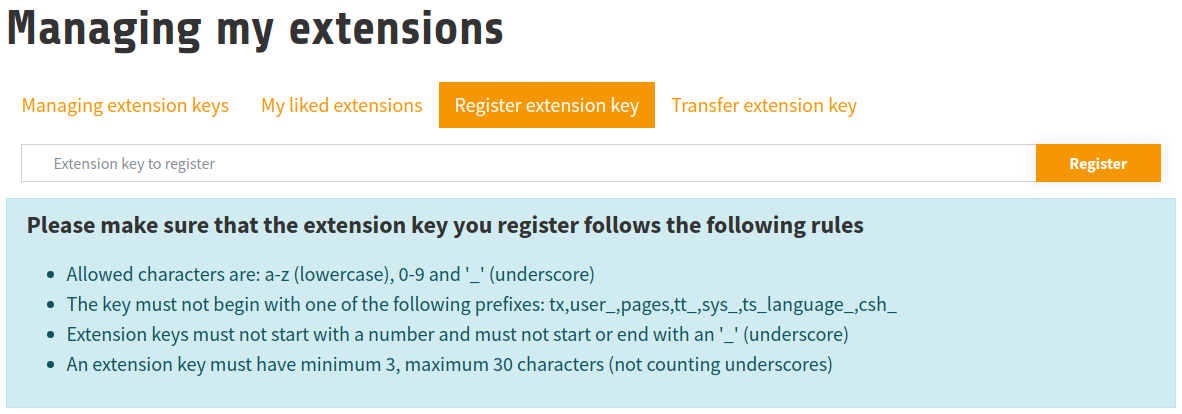Attention
TYPO3 v11 has reached end-of-life as of October 31th 2024 and is no longer being maintained. Use the version switcher on the top left of this page to select documentation for a supported version of TYPO3.
Need more time before upgrading? You can purchase Extended Long Term Support (ELTS) for TYPO3 v11 here: TYPO3 ELTS.
Choosing an extension key
The "extension key" is a string that uniquely identifies the extension. The folder in which the extension is located is named by this string.
Rules for the Extension Key
The extension key must comply with the following rules:
- It can contain characters a-z, 0-9 and underscore
- No uppercase characters should be used (folder, file and table/field names remain in lowercase).
-
Furthermore the key must not start with any of these (these are prefixes used for modules):
- tx
- user_
- pages
- tt_
- sys_
- ts_language
- csh_
- The key may not start with a number. Also an underscore at the beginning or the end is not allowed.
- The length must be between 3 and 30 characters (underscores not included).
- The extension key must still be unique even if underscores are removed, since backend modules that refer to the extension should be named by the extension key without underscores. (Underscores are allowed to make the extension key easy to read).
The naming conventions of extension keys are automatically validated when they are registered in the repository, so you do not have to worry about this.
There are two ways to name an extension:
- Project specific extensions (not generally usable or shareable): Select any name you like and prepend it "user_" (which is the only allowed use of a key starting with "u"). This prefix denotes that it is a local extension that does not originate from the central TYPO3 Extension Repository or is ever intended for sharing. Probably this is an "adhoc" extension you made for some special occasion.
- General extensions: Register an extension name online at the TYPO3 Extension Repository. Your extension name will be validated automatically and you are sure to have a unique name will be returned which no one else in the world will use. This makes it very easy to share your extension later on with everyone else as it ensures that no conflicts will occur with other extensions. But by default, a new extension you make is defined as "private", which means no one else but you have access to it until you permit it to be public. It's free of charge to register an extension name. By definition, all code in the TYPO3 Extension Repository is covered by the GPL license because it interfaces with TYPO3. You should really consider making general extensions!
Tip
It is far easier to settle for the right extension key from the beginning. Changing it later involves a cascade of name changes to tables, modules, configuration files, etc. Think carefully.
About GPL and extensions
Remember that TYPO3 is GPL software and at the same moment when you extend TYPO3, your extensions are legally covered by GPL. This does not force you to share your extension, but it should inspire you to do so and legally you cannot prevent anyone who gets hold of your extension code from using it and further develop it. The TYPO3 Extension API is designed to make sharing of your work easy as well as using others' work easy. Remember TYPO3 is Open Source Software and we rely on each other in the community to develop it further.
Important
It's also your responsibility to make sure that all content of your extensions is legally covered by GPL. The webmaster of TYPO3.org reserves the right to kick out any extension without notice that is reported to contain non-GPL material.
Security
You are responsible for security issues in your extensions. People may report security issues either directly to you or to the TYPO3 Security Team. In any case, you should get in touch with the Security Team which will validate the security fixes. They will also include information about your (fixed) extension in their next Security bulletin. If you don't respond to requests from the Security Team, your extension will be removed by force from the TYPO3 Extension Repository.
More details on the security team's policy on handling security issues can be found at https://typo3.org/teams/security/extension-security-policy/.
Registering an extension key
Before starting a new extension you should register an extension key on extensions.typo3.org (unless you plan to make an implementation-specific extension – of course – which does not make sense to share).
Go to extensions.typo3.org, log in with your (pre-created) username/password and navigate to My Extensions in the menu. Click on the Register extension key tab. On that page enter the extension key you want to register.

The extension key registration form
